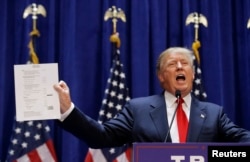Real estate titan Donald Trump's ascent to become the presumptive 2016 U.S. Republican presidential nominee is one of the most unusual in American political history.
Trump, 69, has spent a life building skyscrapers in New York and elsewhere. He has erected casinos along the Atlantic Ocean; bought an airline; and peddled steaks, wine and other products, all with his name branded on them. He wrote a bestselling book about his real estate deals and hosted a television reality show where he famously told losing contestants, "You're fired!"
He has through the years gleefully bragged about his sexual exploits as a New York man about town, divorced two wives and married a third — a onetime supermodel — and sired five children. He lives in a luxury building in the heart of New York, but often skips away to a palm-studded, 58-bedroom oceanfront mansion in the southeastern state of Florida that once was owned by a cereal heiress.
The billionaire's surge to the top of the U.S. political scene is also rare.
When Republicans formally make him the their presidential nominee at their national convention in July, it will be the first time since 1952 that a major U.S. political party has picked someone other than a previously elected official, such as a state governor or U.S. senator, to be its standard bearer.
A retired World War II hero, General Dwight Eisenhower, won the U.S. presidency as a Republican in 1952 and again four years later.
Candidacy dismissed
Over the years, Trump has often flirted with running for the presidency, but U.S. political pundits quickly dismissed him as something of a joke, assuming he would never actually enter the nomination contest. They did so again last June when he descended an escalator at Trump Tower in New York and said he was running for the 2016 Republican Party nomination.
He promptly told supporters that illegal immigration into the U.S. was out of control and that Mexico was allowing rapists and drug abusers to enter the country.
Countless U.S. newspaper columnists, Republican officials and Trump's rivals for the nomination all discounted his chances, offering predictions that he would drop out of the race by a certain date or that voters would quickly reject his candidacy when voting started in state-by-state nominating contests in early February.
Along the campaign trail, seasoned politicians predicted Trump's political demise as he insulted the war hero status of the party's 2008 nominee, Senator John McCain, a prisoner of war in Vietnam in the 1960s. The supposed experts shook their heads as Trump disparaged a female debate moderator after she asked him about his past slurs aimed at women.
Later, Trump mocked a news reporter with a permanent disability, called for construction of an impenetrable wall along the U.S.-Mexico border to halt the flow of illegal immigrants and said the U.S. needed to temporarily stop Muslims from entering the U.S. until it could figure out whether any of them might be terrorists looking to attack the U.S.
In surely a first for a U.S. political debate, he boasted at one point about the size of his genitalia. He branded his opponents with nicknames. In perhaps his most devastating attack, Trump described former Florida Governor Jeb Bush, the brother and son of two former U.S. presidents, as having "low energy." The description stuck and eventually drove Bush from the contest.
No matter what, support grew
Slowly, Trump's political opponents fell by the way, while his support expanded. Polls show it has been heavily weighted toward white men, often without college degrees, many of them left behind without jobs as the country's manufacturing base shrank.
No matter what Trump said, what he proposed, what he tweeted late at night about his political opponents or the news of the day, his political support grew.
Now Trump is headed to a November national election face-off with the likely Democratic nominee, former U.S. Secretary of State Hillary Clinton.
They have a history together: Trump and his current wife, Melania, invited Clinton and her husband, former President Bill Clinton, to their 2005 wedding at Trump's Florida estate.
The Trump-Clinton winner will become the country's 45th president, replacing President Barack Obama, who will leave office in January after two terms in the White House.






